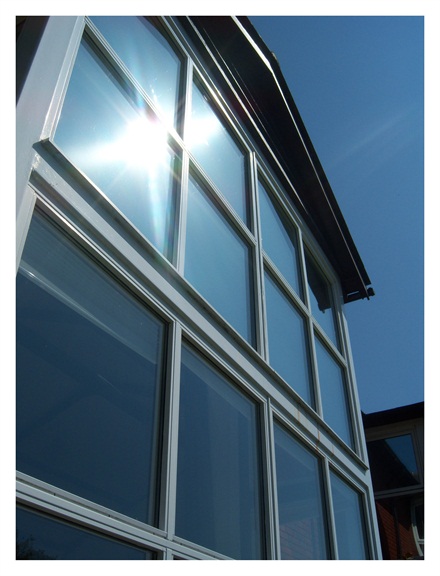
-
Chesham (Head Office)
-
01494 794477
- chesham@windowfilm.co.uk
-
London
-
020 3326 1718
- london@windowfilm.co.uk
-
Birmingham
-
0121 270 2250
- birmingham@windowfilm.co.uk


This issue is particularly prevalent in buildings with sizeable or large quantities of glazing and in these instances the film can have an effect on energy bills by reducing the strain on air conditioning or other cooling systems.
Whilst the sun is almost always welcome, the heat it generates can quickly increase the internal temperature. This is known as solar gain and is markedly reduced with the application of solar control window film.
The film outperforms more traditional methods such as blinds or curtains in a number of ways. The main benefit to film is that it reflects away the heat before allowing it into the property, wheras blinds and shutters allow the heat in. In addtion, these methods block the view to the outside - wheras this is maintained by an application of film.
In addition to the build up of heat, Glare can be a year round issue, with the bright light of summer and the low lying position of the winter sun potentially making it difficult to focus on screens and colleagues, also causing eyestrain and general discomfort. An application of specialist window film from The Window Film Company will take the edge off the brightness, instantly creating a more comfortable light level inside the property. Anti-glare films are available in a range of different finishes to ensure they meet aesthetic requirements, whilst also ensuring that a good level of natural light is transmitted and the view to the exterior maintained.
Throughout the year, the sun can cause fading. This can result in damage to equipment and furnishings and can lead to expensive repairs or replacements. The three main contributing factors to fading are UV light, visible light and heat, and an application of window film will help address all three, thus providing an effective barrier.
UV protection films can block up to 99% of UV rays, thus eliminating the biggest cause of fading (UV rays account for 45% of the contributing factors to fading) and are available in a wide range of finishes and performance levels. Some UV protection films are virtually clear in appearance, ideal for situations when the external appearance needs to remain constant. For the ultimate in fade performance, reflective films will reject UV rays, cut down on heat and also help filter out the brightest of the light.
As well as causing fading, UV rays can be harmful to skin. Those with dermatological sensitivites can find their condition exacerbated by exposure to UV, so window film can provide a hugely valuable and effective protective barrier for those with sensitive skin. Continued exposure to the suns rays can be damaging for those without any pre-existing conditions too. With the damaging effects of the sun becoming increasingly well known and understood, protection from the harmful elements is a welcome benefit of solar control film.
Films are usually applied to the internal surface of the glass, but external options are available for when installing to the inside isn’t an option. For more details on the full range of solar control films, for samples and installation costs, please contact The Window Film Company direct on 01494 794477.
* Front Door Window Film
* How To Frost Windows
* Stick On Window Films
* High Quality Window Films
* Window Tinting for the Home
* Conservatory Roof Films
* Window Protection Films
* Window Foils & Glass Films
* Window Film to Block Sunlight
* High Performance Window Films
* Window Film to Block the View
* Translucent Window Films
* Bathroom Window Film
* Kitchen Window Film
* Obscure Glass Window Film